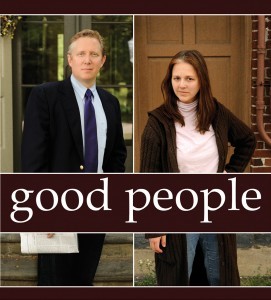
Good People may not be David Lindsay-Abaire’s most immediately appealing work but you may find yourself wanting to watch it more than once. This story about a down-on-her luck dollar store clerk from Boston’s isolated Southie neighborhood is abrasive and redundant but full of hardscrabble poetry, unexpected laughs, and tough revelations. More sensitive regional theatregoers may experience it as a devastatingly human response to Race, David Mamet’s odious legal procedural which received a better-than-deserved workout at TheatreWorks a few months back. Mamet’s incantatory play about a team of lawyers negotiating with a wealthy white man accused of raping a black woman is all artifice. Lindsay-Abaire follows his characters through the streets, and into their homes, workplaces, and favorite bingo bingo parlors on a quest for identity and meaning. Race makes Mamet sound like a tricky old crank with an ax to grind. Lindsay-Abaire emerges as the provocative artist with something useful to say about class, race, gender, prejudice, guilt, memory, the choices we make, and this American life.
“Good people,” is a double-edged compliment suggesting a hearty mix of realness and reliability. Culturally it also rhymes with “good old boys” and faintly echos “Good Germans,” the ordinary people of Germany who, being caught up in self-interest, failed to notice the Holocaust.
Don’t be mislead by my free association. Good People isn’t about Nazis. It’s not an “IT COULD HAPPEN AGAIN” play. It does, however, confront audiences with a mildly dystopian vision of an America where poverty is moral justice. BINGO is the big metaphor in this humane challenge to widely held notions that success equals virtue and people fail, primarily, as the result of their own bad choices.
Kim Justice isn’t physically imposing but she makes Margret shifty, and nearly threatening. Although she’s harmless it occasionally undermines any sympathy we might have for the mother of a severely handicapped daughter who can’t seem to keep any of her low-wage jobs. But Justis is a savvy comediene, able to find laughs tucked between her characters rocks and hard places.
In a moment of desperation Margret turns to an old boyfriend for help. Mike, solidly played by Michael Gravois, is a smart, lucky guy who got out of Southie and stayed out. He’s a successful doctor now, living in an upscale Boston community. He gives back through charities like the Boy’s Club and is known to be a good person, although he he’s unable and maybe even unwilling to help his old flame. Mike has secrets, and his marriage to Kate, a younger African-American intellectual and author (Lisa Lynch) is fractured and unstable.
Mike invites Margret to a party after she calls him “lace curtain” Irish challenging his Southie bona fides. The party is eventually called off but Margret shows up anyway, and the polite conversation that ensues is devastating.
Gravois and Justis have both done better work but are still very good here. As unlikely as it may sound their physical and emotional relationships bear more than a casual relationship to Gary Sinise and John Malkovich in the original production of Sam Shepard’s True West. This is clearly their show although they are supported by a fantastic quartet of character actors who occasionally threaten to steal it.
Dottie (Irene) Crist, Jean (Mary Buchignani Hemphill), and Stevie (Joshua Quinn) play Margret’s friends, neighbors and sometimes co-workers. They’re salt of the Earth, getting by the best they can while offering one another the few scraps of human kindness they can afford. It’s a sure bet that these three — or three people just like them— will be marking numbers off their Bingo cards when the world ends. They ground the play, giving it much of its poetry and many of its best laughs. As a wife trying very hard to understand her husband and keep their troubled marriage together Lisa Lynch, who usually works backstage as Playhouse on the Square’s director of communications, turns in a subtle, nearly cinematic performance that just barely launches itself past the footlights, but still lands with a real wallop. Hopefully this won’t be the last time she comes out to play.
Phillip Hughen’s folding set is cleverly engineered but a little flimsy and it never really captures the sturdy, crumbling beauty of old Southie or effectively contrasts that with Mike’s more upscale comforts.
Good People won’t be the feel-good hit of this, or any season. With its stories of scratch-off cards, death in the streets, and endless disappointment, it’s a pretty bleak affair. It’s also one of the best plays you’re likely to see all season.
For more information, click.